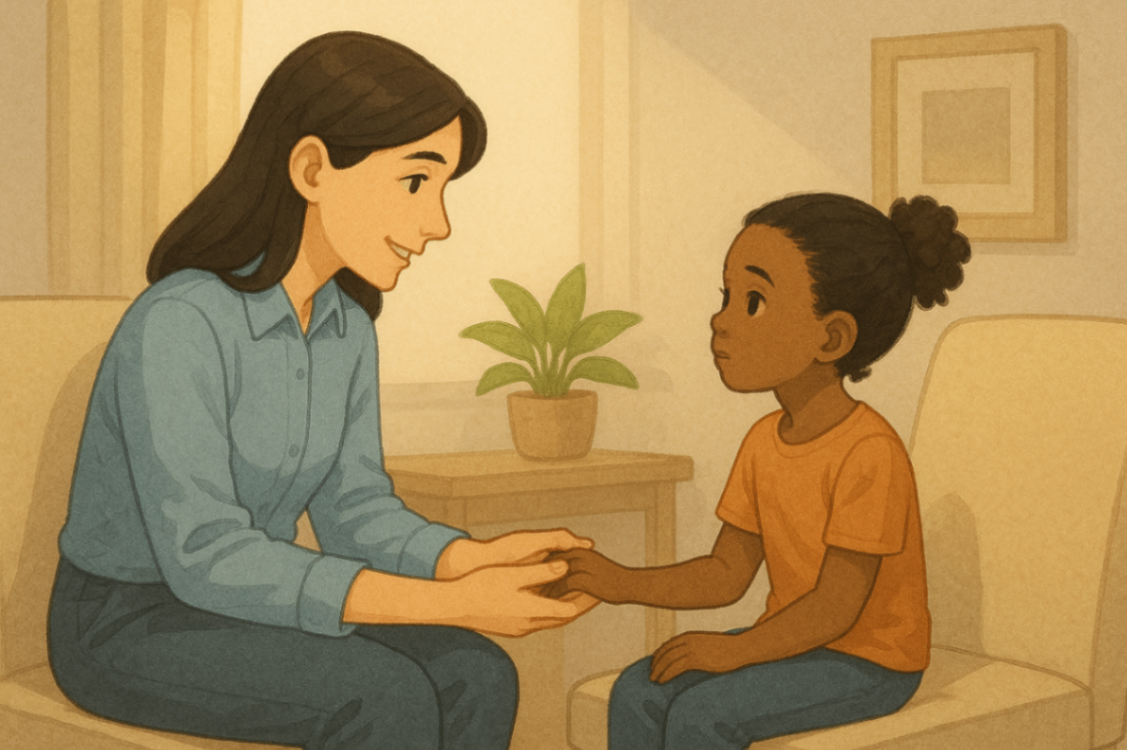
ndis supports for children: a guide for liverpool families
23 June, 2025

Key Highlights
-
This guide offers a detailed overview of the National Disability Insurance Scheme (NDIS) catering to families in Liverpool, aiding children with developmental delay or disabilities.
-
It outlines early intervention strategies, including therapy supports and behaviour support, tailored to a child's developmental concerns.
-
Key NDIS support categories—core, capacity building, and capital supports—are explained to help you manage NDIS funding effectively.
-
Learn how to navigate eligibility, apply for plans, and access support through trusted local early childhood partners.
-
Understand common supports available for children with behavioural needs and the vital role of NDIS providers in delivering quality assistance.
-
Get answers to frequently asked questions regarding NDIS supports, funding categories, and eligibility criteria for children with disabilities like autism or ADHD.
Introduction
Every child should get the right help to grow and do well. If your child in Liverpool has any kind of disability or faces problems with their growth, the National Disability Insurance Scheme (NDIS) can help. The NDIS uses an early childhood approach to make sure kids and families get fast and the right kind of help. This help gives you quality supports.
With NDIS funding, you can get access to things like therapy supports, help for behaviour, or assistive technology. This means you can make a plan that fits your child’s needs and help them with their development. The NDIS and its early childhood team are here to work with you, so your family can get good support. Let’s talk more about the ways NDIS can help you, your child, and your family have a better life.
If you want a clear, parent-friendly explanation of Positive Behaviour Support, read Understanding Specialised Positive Behaviour Support for Kids.
Understanding NDIS and Its Importance for Liverpool Families
 The National Disability Insurance Scheme (NDIS) helps Liverpool families when their children have developmental concerns or a disability. With the right NDIS plan, families can get the supports they need. These services focus on the child’s functional capacity and help them join in everyday life.
The National Disability Insurance Scheme (NDIS) helps Liverpool families when their children have developmental concerns or a disability. With the right NDIS plan, families can get the supports they need. These services focus on the child’s functional capacity and help them join in everyday life.
Early childhood intervention is important for every family. If your child is under six and shows signs of a developmental delay, or under nine and has a disability, the right help on time can make a big difference. Support from the NDIS lets your child grow, learn, and connect with others. Families in Liverpool now have these tools to give their children a strong start through early childhood support.
What is the NDIS and Who is Eligible?
The National Disability Insurance Scheme (NDIS) helps people with disabilities by giving funding and supports. The goal is to help people be more independent and be part of their community. The National Disability Insurance Agency (NDIA) runs the scheme. This ensures that families get the right resources for their needs.
If your child is below six and has developmental delays, or under nine and has disabilities, they may get help from the NDIS early childhood approach. You do not always need a formal diagnosis. This helps families get services for their child’s needs as soon as possible.
To get help, some things have to apply: the child’s disability needs to be permanent, or likely to stay that way, and the disability must make it hard for them to do things. Children over nine can get guidance from local area coordination partners. They help families learn how to get NDIS supports or other help. Talking with a representative of the National Disability Insurance Agency (NDIA) can help parents make the best choices and understand what is needed for their child’s development journey.
If you’re unclear on how these supports are managed, here’s a breakdown of the difference between NDIS and NDIA.
Key Benefits of Early Access to NDIS Supports
Starting early with NDIS supports helps your child grow and get ready for future learning. Early intervention is there for children under six with developmental delays, or for those under nine with disabilities. It gives solutions that fit their needs.
Here’s why getting help early is so important:
-
Enhanced skill-building: Therapy supports help boost a child’s skills in things like talking, moving, or being independent.
-
Increased inclusion: NDIS supports let children join in at school or other community places with other kids.
-
Reduced developmental challenges: Getting help at the right time deals with any delays early on and makes tough things easier later.
Getting early NDIS funding helps both your child and your whole family. It gives families knowledge and confidence to handle care in the best way. If you are in Liverpool, working with early childhood partners can help your child get support at the best time.
Understanding the Three Main NDIS Support Categories
Navigating NDIS plans starts with knowing about its three main types of supports: core supports, capacity building supports, and capital supports. These three parts help you use your child’s NDIS budget. You can use these funds for things your child needs every day, to build skills, or for one-off upgrades and changes.
Each support type is set up to meet different goals. You might need someone trained to help your child each day, or maybe you need assistive technology. Some people know how to set up these supports. They will work with you to make sure your child gets the right help. Now, let’s break down each NDIS budget type so you get the most out of your plan.
Core Supports: Daily Living and Participation
Core supports are the base of your child’s NDIS plan. These help meet the needs of daily life and let your child take part in more activities. The funding covers important services to help your child do more things on their own at home and out in the world.
For example, core supports in a child’s NDIS plan may pay for trained support workers. They can help with dressing, showering, and other daily needs. There are also flexible parts of the budget. This can include getting your child to school or to events with friends, which helps them feel included in the community.
There are main categories that give help with things like better home living. When you work with your local NDIA planner, you are more likely to use your budget the right way. With core supports in the NDIS, families in Liverpool can focus on what is practical and helps their kids grow. This gives each child the steady start they need to do well.
Capacity Building Supports: Developing Skills and Independence
Capacity building helps children learn the skills they need for daily life and to get along with others. This funding is to help kids do better in things like school, building friendships, and feeling good about themselves.
With therapy supports, children get step-by-step help to grow their thinking skills or body movements. For kids in school, capacity building can also help get them ready for the next steps, like going to college or starting work, following what fits their growth.
These supports also help your child join fun and group activities. NDIS plans give families support to use therapy funding in the best way, so children can feel sure of themselves and do more on their own. Working with Liverpool providers lets you find the tools your child needs to learn these important life skills.
Capital Supports: Equipment and Modifications
Capital supports fund essential modifications and assistive technology designed to assist children in overcoming physical or cognitive barriers to access everyday environments.
|
Category |
Examples |
|---|---|
|
Assistive Technology |
Wheelchairs, communication devices, mobility aids. |
|
Maintenance, Repair & Rental |
Upkeep or temporary trials of assistive technology. |
|
Home Modifications |
Handrails, accessible bathrooms, or widened doorways. |
|
Specialist Disability Accommodation |
Custom housing solutions for children requiring high-support facilities. |
Capital supports offer sustainable solutions and are stated budget categories within your child’s NDIS plan. Working alongside Liverpool service providers ensures modifications meet individual needs. With carefully managed capital supports, your child can navigate their environment with ease, enabling greater independence.
Common NDIS Supports for Children with Behavioural Needs
 There are many supports that can help with behavioural needs in kids. Some of these are early intervention services. These are made to improve the way your child works every day and help their growth. Therapy supports are also important. They can give you and your child the right ways to handle problems that come with autism or developmental delay. NDIS funding from your child’s NDIS plan can give families the help they need. This can mean quality supports from trained people and assistive technology. It helps make sure each child gets the right provider and the best support for their needs.
There are many supports that can help with behavioural needs in kids. Some of these are early intervention services. These are made to improve the way your child works every day and help their growth. Therapy supports are also important. They can give you and your child the right ways to handle problems that come with autism or developmental delay. NDIS funding from your child’s NDIS plan can give families the help they need. This can mean quality supports from trained people and assistive technology. It helps make sure each child gets the right provider and the best support for their needs.
Our Role as a Behaviour Support Provider in Liverpool
Providing full behaviour support in Liverpool means we look at each child’s own early childhood development. We work to find out what they need. We also talk with families, teachers, and early childhood partners in the area. By giving therapy supports and making plans that fit each child, we aim to help increase their functional capacity and help them feel better in life. When families get the right details about the NDIS and its supports, they can better deal with the national disability insurance scheme. This helps make sure every child has what they need for the best results.
Conclusion
Navigating the NDIS can be a lot to take in, but understanding the different support categories for your child is essential. By accessing the right combination of Core Supports, Capacity Building Supports, and Capital Supports, families in Liverpool and surrounding suburbs—such as Casula, Lurnea, Prestons, Moorebank, Hoxton Park, Ashcroft, Miller, Green Valley, Chipping Norton, Wattle Grove, Cabramatta, Mount Pritchard, Glenfield, Edmondson Park, Ingleburn, Middleton Grange, and Cartwright—can take meaningful steps toward improving their child’s daily life.
Getting access to these supports early not only addresses your child’s current needs, but also lays the groundwork for developing independence and long-term skills. And remember—you’re not alone in this. Support coordinators, allied health teams, and NDIS providers are here to help you create a plan that’s personalised to your child’s journey.
Looking for the right NDIS supports for your child? Our team can help you understand your options and connect you with tailored services like therapy, assessments, and behaviour support—so your child gets the care they deserve.
Call us today or Book your consultation to start building a personalised support plan that meets your child’s needs.
Frequently Asked Questions
What are the main NDIS support categories for children?
The NDIS gives help in three key areas. These are called core supports, capacity building, and capital supports. Core supports help with daily activities and joining in on things. Capacity building is for building skills and helping kids to be more independent. Capital supports cover things like equipment and changes at home or other places. Each type is made to fit a child’s needs and match the goals of NDIS funding. The aim is to help kids grow and to include them in more things. These types of NDIS support work together to give the best care.
Is behavioural therapy part of capacity building or core?
Behavioural therapy is part of capacity building supports in the NDIS framework. This means the focus is to help children build new skills and become more independent, not just give them regular help. The aim of this is to help them grow strong and be able to do things by themselves, which matches with the goal of the NDIS to encourage self-sufficiency and resilience.
Can children with autism or ADHD access NDIS funding?
Yes, children who have autism, ADHD, or other disabilities in their development can get ndis funding. The main thing is that the condition has to affect their functional capacity in daily life. Families can apply for help through the National Disability Insurance Agency. They will work with the agency to get the right supports for their child under the early childhood approach. This makes sure families get what they need with early childhood NDIS supports.
How do I know which supports my child qualifies for?
Talk to your local area coordinator or an NDIA representative. They will look at your child’s needs and check your NDIS application. NDIS providers can help you set up funding plans that fit your child’s goals. Plan reviews are done often, so the support keeps meeting your family’s needs.
.svg)

















